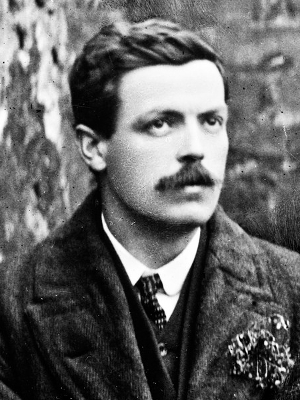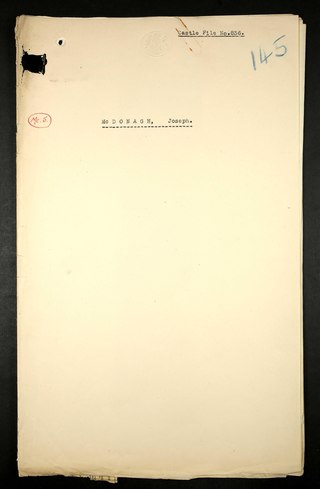See also
- Michael McDonagh (1904–1975), Irish boxer
- Mike McDonagh, Irish United Nations official
Michael MacDonagh may refer to:

Michael O'Hanrahan was an Irish rebel who was executed for his active role in the 1916 Easter Rising.

Thomas Stanislaus MacDonagh was an Irish political activist, poet, playwright, educationalist and revolutionary leader. He was one of the seven leaders of the Easter Rising of 1916, a signatory of the Proclamation of the Irish Republic and Commandant of the 2nd Battalion, Dublin Brigade of the Irish Volunteers, which fought in Jacob's biscuit factory. He was executed for his part in the Rising at the age of thirty-eight.
The GAA Hurling All-Ireland Senior Championship, known simply as the All-Ireland Championship, is an annual inter-county hurling competition organised by the Gaelic Athletic Association (GAA). It is the highest inter-county hurling competition in Ireland, and has been contested every year except one since 1887.

Martin Faranan McDonagh is a British-Irish playwright and filmmaker. He is known for his absurdist black humour which often challenges the modern theatre aesthetic. He has received numerous accolades including an Academy Award, six BAFTA Awards, four Golden Globe Awards, three Olivier Awards, and nominations for five Tony Awards.
Mac Diarmada, also spelled Mac Diarmata, is an Irish surname, and the surname of the ruling dynasty of Moylurg, a kingdom that existed in Connacht from the 10th to 16th centuries. The last ruling king was Tadhg mac Diarmata, who ruled until 1585.
Rockwell College, founded in 1864, is a voluntary day and boarding Catholic secondary school near Cashel, County Tipperary in Ireland.

Cloughjordan, officially Cloghjordan, is a town in County Tipperary in Ireland. It is in the barony of Ormond Lower, and it is also a parish in the Roman Catholic Diocese of Killaloe.
Donnchadh is a masculine given name common to the Irish and Scottish Gaelic languages. It is composed of the elements donn, meaning "brown" or "dark" from Donn a Gaelic God; and chadh, meaning "chief" or "noble". The name is also written as Donnchad, Donncha, Donnacha, Donnchadha and Dúnchad. Modern versions include Donnacha, Donagh, Donough, Donogh and Duncan.

The Archbishop of Dublin is a senior bishop in the Church of Ireland, second only to the Archbishop of Armagh. The archbishop is the diocesan bishop of the United Dioceses of Dublin and Glendalough and the metropolitan bishop of the Province of Dublin, which covers the southern half of Ireland, and he is styled Primate of Ireland.

The Diocese of Kilmore is a Latin Church diocese which is mainly in the Republic of Ireland although a few parishes are in Northern Ireland. It is one of eight suffragan dioceses which are subject to the Metropolitan Archdiocese of Armagh.

Joseph Michael MacDonagh was an Irish Sinn Féin politician.

The surname McDonagh, also spelled MacDonagh is from the Irish language Mac Dhonnchadha, and is now one of the rarer surnames of Ireland.
Thomas Moloughney was an Irish hurler who played at club level with Kilruane MacDonagh's and at inter-county level with Tipperary.
Jarlath is an Irish given name. Notable persons with this name include:
Mac Craith is an Irish surname, one branch of which is rendered McGrath.
Michael MacDonagh, O.P. (1698–1746) was an Irish Roman Catholic prelate who served as the Bishop of Kilmore from 1728 to 1746.
Niall O'Meara is an Irish hurler who plays for Tipperary Senior Championship club Kilruane MacDonagh's and at inter-county level with the Tipperary senior hurling team. He usually lines out as a left wing-forward.
John McDonagh may refer to:

Michael MacDonagh was an Irish author and journalist. From 1894 until 1933 he wrote for The Times as a member of their parliamentary and reporting staff.
College of Corpo Santo, Lisbon was an Irish Dominican College in Lisbon, founded in 1634 by Daniel O'Daly OP, who was its first Rector. The College of Corpo Santo at Cais do Sodré was built in 1659 for the Irish Dominicans, supported by King Philip of Spain. Since so many ordained priests who returned to Ireland were killed during the Penal Laws the seminary was called the Martyr's Seminary. The college was greatly damaged in the Great Lisbon Earthquake of 1755, and it was not re-built until 1771. It ceased as a seminary after 1850, with the Irish Dominicans in San Clemente al Laterano, Rome available to train candidates for the order, and with the last significant Penal Laws removed in 1829, much of the property was sold to fund the establishment of St. Mary's Priory, Tallaght, Dublin.